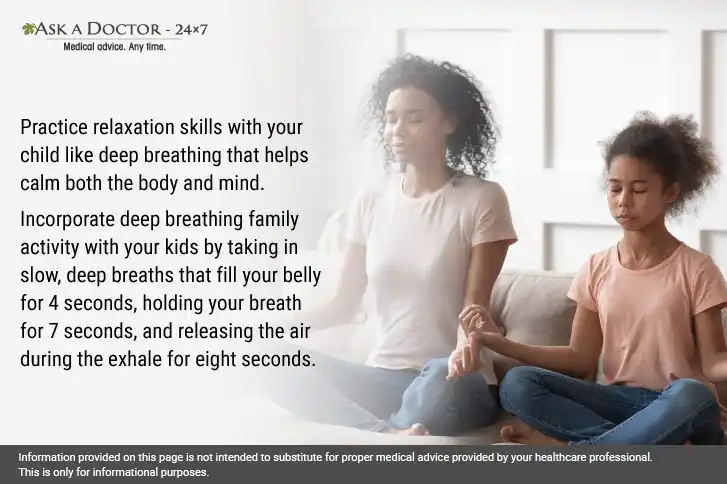Children's Mental Health: Recognize Their Signs Of Struggle And Know When Your Child Needs Help
Mental health is the whole state of well-being of how you think, feel, and behave. It is distressing for adults to deal with mental distress, but do you know that children also suffer from mental illness? Yes! Children often experience ups and downs that impact their emotions and behavior. However, when children are unable to "bounce back" from setbacks, it begins to impact the emotional and behavioral aspects of their lives. This may indicate that kids are experiencing mental health issues.
Dealing with mental illness in children can be challenging for the parents, as merely taking medicines won’t improve the situation. The first step is to identify and acknowledge the problem. Mental health challenges differ from physical illness, and the treatment process requires parents’ involvement, lots of love, empathy, and understanding. In this blog, let’s understand the warning signs of childhood mental illness and how to support your child.
Types of Mental Health Disorders in Children
The common mental health issues in children are typically classified into:
Depression and anxiety disorders: Anxiety happens when a child faces constant fears and worries and finds it tough to overcome them. It can be caused by a situation at school, at home, or during play activities. A child suffers from depression when sadness and hopelessness overcome to an extent that affects the child’s day-to-day activities, causing a loss of interest in things that earlier made the child happy.
Other conditions: Attention Deficit Hyperactivity Disorder (ADHD), post-traumatic stress disorder (after a certain event like the death of a close person), conduct disorder (like breaking rules and laws or causing self-harm), and oppositional defiant disorder (defiant towards family or friends) are some of the other mental disorders commonly observed in children.
What are the symptoms of childhood mental disorders?
It can be difficult to distinguish between difficult behaviors and feelings that are a natural part of development and those that should raise red flags. Therefore we have jotted down some of the commonly observed warning signs of childhood mental distress to help parents identify and act accordingly. You must consult a psychologist immediately, your child:
- Appears sad or unhappy, or cries a lot, most of the time
- Sleeps excessively or insufficiently, experiences nightmares frequently, or appears drowsy during the day.
- Shows no interest in playing with other kids or finds it difficult to make friends.
- Struggles in the classroom or have seen a significant drop in their grades.
- Complaints about frequent headaches or stomachaches with no known medical cause.
- Frequently show irritability, throw tantrums most of the time, or have regular outbursts.
- Often appear anxious or afraid.
- Exhibit changes in eating habits.
- Develop a tendency to physically hurt themselves.
- Have lost interest in activities they formerly found enjoyable.
- Have low energy most of the time.
- Tells you repeatedly that s/he feels like someone is attempting to take control of their thoughts, or s/he hears sounds that other people do not hear.
How can I support my child in managing their mental health?

You are a key responsible for your child's treatment plan's success. To take care of your child and yourself, do the following:
- Read and learn about the mental health problems in children, signs, and treatment. If signs of mental health problems last for more than a few weeks, consult a healthcare professional as soon as possible.
- Consult your kid's healthcare professional for guidance, describe the child’s behavior that concerns you. Discuss how to deal with challenging behavior and how to respond to your child.
- Participate in parenting education courses intended for parents of kids suffering from mental health disorders.
- See if your child’s teachers, close friends, family, or other caregivers have also noticed similar changes in your child's behavior. Share this information with your medical practitioner who treats the child.
- Seek strategies to manage your child’s stress, like communicating empathetically, spending quality time together, and engaging in fun activities and games.
- Look for methods to unwind and spend quality time with your kid by planning picnics and short fun trips.
- Highlight your child's accomplishments and talents, and combat negative self-talk.
Hence, we have learned that mental health issues are as serious as physical illnesses. Parents are the first to identify symptoms of mental illness in children. It's critical to identify the warning signs and receive help as soon as possible to prevent problems from getting worse. Never hesitate to see your child's health care provider or a specialist, related to your child’s ongoing behavior.
Besides reaching out to your child’s doctor, parents can extend their support by spending quality time with their child and making them feel loved and positive. Always remember that good mental health is key to healthy child development.
If you have any questions about mental health issues in children, you can Ask a Pediatrician at Ask a doctor, 24x7.
Recently Answered Queries Related to Children's Mental Health Challenges
- How To Cure Muscle Weakness And Improve Mental Health?
- ADHD. Check On Mental Health?
- Recommend Help For Mental Health
- Suggest Medication For Mental Health
- Does Clonazepam Affect Mental Health?
- Is Baclofen Effective In Treating Alcoholism In A Person With Mental Disorder?
- Suggest Treatment For Conversion Disorder
- Suggest Treatment For Stress In A Teenager
- Suggest Treatment For Borderline Personality Disorder
- How To Treat Obsessive Compulsive Disorder?
- How Can OCD And Borderline Personality Disorder Be Managed?
- What Are The Physical And Mental Signs and Symptoms Of Psychosomatic Stress Disorder?
Disclaimer: Information provided on this page is not intended to substitute for proper medical advice provided by your healthcare professional. This is only for informational purposes.
Ask a Specialist
Recent Questions


